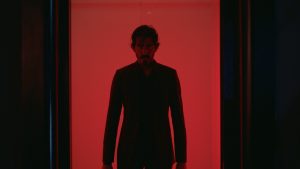Most of the reviews for Mike Leigh’s Happy-Go-Lucky seem to claim that the film is as lightweight as the title would indicate. Strange then, that I found it uncomfortably subversive, even disturbing – not that that’s a bad thing, though I’m not so sure it was Leigh’s intention, either.
The director, famed for his UK working-class dramas like Naked and Vera Drake, has gone out of his way to make a lighter comedy, but he hasn’t completely shook the bleak nature of his past films.
It all starts with Poppy, an irrepressible young woman with the titular outlook on life, forever smiling and continually beaming with joy. In a Hollywood remake, expect to see Cameron Diaz or Anna Faris in the role. But here, Poppy is quite marvelously played by Sally Hawkins, who comes as close as possible to bringing a character like this to life; Hawkins deserves the heaps of praise she’s received for the role that resulted in an Oscar nomination.
Poppy doesn’t use happiness as a cover or defense mechanism; no, she’s just really, really happy and hopeful and pleasant, almost to the point of derangement. The proper comparison, I think, would be to The Simpsons’ Ned Flanders, minus the religious aspect. With a character like this, there’s a thin line between a lovable bundle of joy and a mental patient, and it’s a line Happy-Go-Lucky frequently dances around.
I only fault Leigh for not exploring the character further; the film is character study, but he’s already made his mind up about Poppy, elevating her to exalted status, recommending we all be more like her. He makes the mistake of assuming viewers will see her in a similar light (and to be fair, most critics have). I’m sorry, but she just seems too damn crazy to me.
In typical Leigh fashion, there isn’t much of a plot here – events seem to unfold naturally as we experience a few days or weeks in the life of Poppy: her days as a teacher with young students, her weekends with her friends at clubs, flamenco lessons, driving lessons, a trip to the doctor or to visit her younger sister.
Throughout, Poppy is wide-eyed and enigmatic, with a “gosh!” when her bike is stolen or a “gee, golly!” when the chiropractor snaps her back into place. I’ve never met anyone like this, nor would I want to.
If Poppy is the anti-Taxi Driver, then she’s equally matched by her driving instructor, Scott (Eddie Marsan), Happy-Go-Lucky’s version of Travis Bickle. Intense and angry, he’s the very definition of road rage: someone who shouldn’t be allowed to get in a vehicle, much less teach others how to drive.
Poppy and Scott are two clashing forces that form an unlikely heart to the film. Marsan is terrific, and I mostly sided with him in the film’s climactic scene, even though the film went in the opposite direction.
While I seem to be in the minority, I found this lead character downright unappealing and borderline psychotic, and Leigh’s treatment of her concerning.
In truth, I didn’t really care for Happy-Go-Lucky, but to dismiss it outright would be a mistake. It’s an extremely interesting picture, especially among the Leigh oeuvre, sure to spark debate and at least some level of admiration, particularly for the performances of Hawkins and Marsan. Recommended with reservations.














